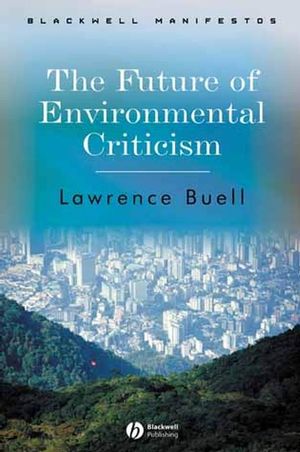The Future of Environmental Criticism: Environmental Crisis and Literary ImaginationISBN: 978-1-4051-2475-1
Hardcover
208 pages
August 2005, Wiley-Blackwell
 This is a Print-on-Demand title. It will be printed specifically to fill your order. Please allow an additional 10-15 days delivery time. The book is not returnable.
Other Available Formats: Paperback
|
||||||
"A much needed overview of a vital new field, The Future of
Environmental Criticism captures the ecocritical
movement’s present state of dynamic metamorphosis as it opens
into post-humanism and ecofeminism, engages poststructural theory
and environmental justice, and tests out alliances with various
scientific fields and critical science studies in an increasingly
international context. Nobody could accomplish this task better
than Lawrence Buell, whose earlier books The Environmental
Imagination and Writing for an Endangered World have
become defining works for the environmental turn in literary
scholarship. The previous works were primarily American in focus,
while the new one begins in an Anglo-American context and broadens
to a global literary scope. This latest volume completes an
indispensable trilogy." Louise Westling, University of
Oregon
“Buell (Harvard) is one of the US’s major voices on
environmental criticism-.-a fairly recent area of literary and
cultural studies known as “ecocriticism.” Several
recent works have offered suggestions about how this movement or
approach can be defined, but none addresses the subject so broadly,
so authoritatively, and in such precise and carefully considered
terms as this one does- Buell helped establish the terms for
humanistic environmental writing with The Environmental Imagination
(CR, Sep’95, 33-0121) and Writing for an Endangered World
(CH, Nov01., 39-1386), and he perceives the present study as a
“roadmap of trends, emphases, and controversies within green
literary studies more generally.’ Comprising five brief
chapters, all accessible and extraordinarily well informed, the
book starts with a history of environmental criticism and writing;
moves to a consideration of the relevant major writers involved in
complicating its issues; considers its impact in terms of ethics
and gender and of the judiciary and politics; and finally looks at
its future, The glossary, full notes, and extended bibliography
make it clear that the book’s main thrust is definitional,
though Buell sees the study as more ‘essayistic” than
definitive, Summing Up: Essential: All academic libraries.”
T. Loe, SUNY Oswego
“Buell’s survey, framed by chapters about the
emergence and possible future development of ecocriticism,
organizes its material through a focus on issues of literary
realism and representation in their relation to nature (chapter 2);
the central role of place, space, and imagination for ecocritical
thought (chapter 3); and a discussion of politics and ethics in
ecocriticism that ranges from deep ecology to ecofeminism and
environmental justice (chapter 4). These broad but well chosen
categories allow Buell to cover an enormous range of creative and
theoretical material that he discusses with the encompassing
mastery and insight that readers of his two earlier works on
ecocriticism … have come to expect.”
Contemporary Literature
"This is an important beginning that shows how the future
of the book lies in the past." Travis V. Mason, Canadian
Literature 191
“An extremely methodical, accessible, and timely
introduction to the field of environmental criticism for
specialists and non-specialists alike, a teasing insight into
ecocriticism at work, and an excellent exposition of the
development and evolution of the discipline in its most recent
manifestations.”
Ruth Glynn, University of Bristol, Modern Language
Review



